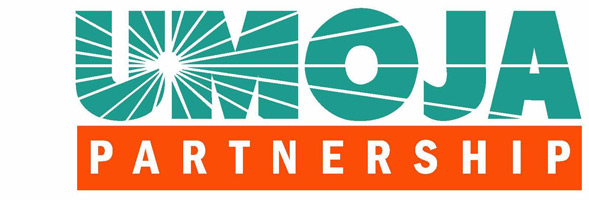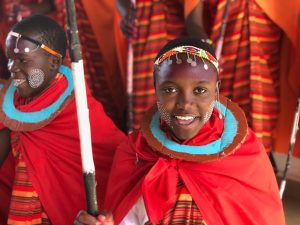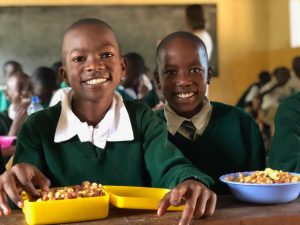by Bailey and Courtney Sanford, 2018 Duke Divinity Interns
Hello friends! I hope you all are well. Below are some updates from our last few weeks in Kenya:
One of our internship tasks is to conduct interviews with students and stakeholders regarding a “Boy’s Empowerment” program that Umoja will begin this fall. For many years they have had “GET UP” or “Girls Empowerment Team of the Umoja Project.” The GET UP program offers psychosocial support and life-skills instruction for girls in grades 6-12. Our hope is to develop a similar program for boys, as absenteeism and drop-out rates are high for boys in this region. The goal of our interviews is to develop a curriculum that adequately addresses the specific challenges that these boys are facing.
These interviews have been instructive, and I’ve learned a great deal about the many challenges that the boys face. Many, for example, will drop out of school to work casual jobs such as collecting sand from the river or making concrete blocks. Still others are pressured into marriage by young widows who are looking for a husband to support them. In addition, these boys face the same challenges as boys in the US: drugs, alcohol, and sex among them.
Most of the interviews that I’ve conducted have been with groups of boys or with male teachers. Last Sunday, however, I had the chance to sit down with seven high school girls to discuss the needs they saw in their male colleagues. Unsurprisingly, it was the most generative discussion yet. According to the girls, the boys were drawn to drugs, fighting, and theft by the pressure of cultural understandings of masculinity. They were able to see the boys’ situations with objective clarity and to critically interpret the challenges we had been hearing from the boys. This is the gift of community, having another to serve as a corrective lens to our worldview, checking our biases and challenging our prejudices.
I’m especially grateful for my host, Francisca, who has been my “corrective lens” for the last several weeks. Earlier in life, she was a nun, so she has a developed understanding of what community life entails. She now leads a group of former nuns called DELOC or Dedicated Life Outside of the Convent. She has been invaluable as a resource for helping me to interpret my new environment—and she has asked just as many probing questions about life in the United States. Why are Americans always in a hurry? Is it true that all Americans have guns at home?
I look forward to many more weeks of living with and learning from Francisca.
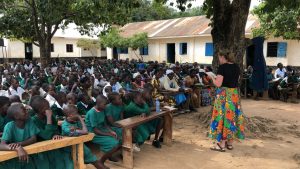 One of our other internship tasks is leading a daily “PPI” or “pastoral program of instruction.” These consist of songs, prayers, a Bible lesson, and time set aside for questions. The two most common questions are “What’s the climate like in the United States?” and “Do you know Obama?” Sometimes the questions drift into the realm of politics: “What do you think of Donald Trump?” “Is the United States politically stable?”
One of our other internship tasks is leading a daily “PPI” or “pastoral program of instruction.” These consist of songs, prayers, a Bible lesson, and time set aside for questions. The two most common questions are “What’s the climate like in the United States?” and “Do you know Obama?” Sometimes the questions drift into the realm of politics: “What do you think of Donald Trump?” “Is the United States politically stable?”
One student’s question last week was particularly arresting. While we were discussing the Umoja project’s partner churches back home, one student asked: “Why do mzungus (the word for foreigners, or more specifically, white people) in the United States love kids in Kenya?”
I fumbled through an answer, citing Biblical precedent for caring for the poor and eventually came to some wisdom from the Desert Fathers. “My salvation,” so the Desert Fathers would say, “is caught up in the salvation of my brother.” If I earnestly believe that God is at work redeeming the world, my life and my community cannot be redeemed unless theirs is redeemed also. When we pray “Thy kingdom come, thy will be done…” it is not just a prayer for Durham, it is also a prayer for Chulaimbo. This is a reckoning for those of us in the United States, a country whose wealth and security has been built on others’ lack of the same. This is the same understanding that stirred Martin Luther King Jr. to say that “Injustice anywhere is a threat to justice everywhere. We are caught in an inescapable network of mutuality, tied in a single garment of destiny. Whatever affects one directly, affects all indirectly.”
It’s no accident that religion, ligament, and obligation all share an ancient root. A fulsome vision of Christian hope for the world cannot exist apart from a fulsome understanding of our interconnectedness and obligation to the poor around the world. I wonder how the Church’s practices might differ if we were to hold the global poor at the fore of our consciousness. I also wonder how we might do this without contributing to compassion fatigue. It is one thing to be confronted with the Gospel; it is another thing altogether to beat people over the head with guilt ad infinitum.
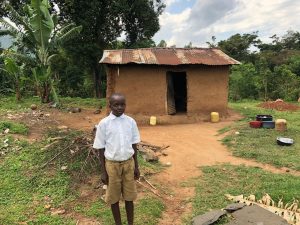 Thank you all so much for your donations toward the shelter fund! We’ve been able to build not one, not two, but three shelters thanks to your generosity. The Union Grove UMC Vacation Bible School funds will go toward building a new home for the family of William Omondi (photo attached). William is a student in grade 6 at Agulu Primary School. He lives with his mother, Beatrice Omboyo. His father, Jakob, passed away in 2015 from AIDS and his mother is HIV-positive. She also has paranoid schizophrenia, so his home life is very unstable. Despite only being 12 years old, he is the primary breadwinner in his family. He makes money by doing casual labor for other families, such as fetching water and cleaning homes.
Thank you all so much for your donations toward the shelter fund! We’ve been able to build not one, not two, but three shelters thanks to your generosity. The Union Grove UMC Vacation Bible School funds will go toward building a new home for the family of William Omondi (photo attached). William is a student in grade 6 at Agulu Primary School. He lives with his mother, Beatrice Omboyo. His father, Jakob, passed away in 2015 from AIDS and his mother is HIV-positive. She also has paranoid schizophrenia, so his home life is very unstable. Despite only being 12 years old, he is the primary breadwinner in his family. He makes money by doing casual labor for other families, such as fetching water and cleaning homes.
The family’s need for shelter is great, as their roof leaks in several places and the rear wall is in danger of collapse. The damp interior of their home has contributed to many health complications for the family. His older sister, Margaret Adhiambo, died from pneumonia just three weeks ago (you can see her grave in the background of the photo) and his younger sister, Beryl Awuor, is currently being treated for pneumonia.
Despite the manifold challenges he faces at home, William is excelling at school. He is ranked #3 in his class of 75 students and aspires to attend Chulaimbo Boy’s Secondary School when he finishes primary school. Ultimately, he hopes to join the university and become a pilot.
Thank you again for all of your love and support! We look forward to seeing you soon!
